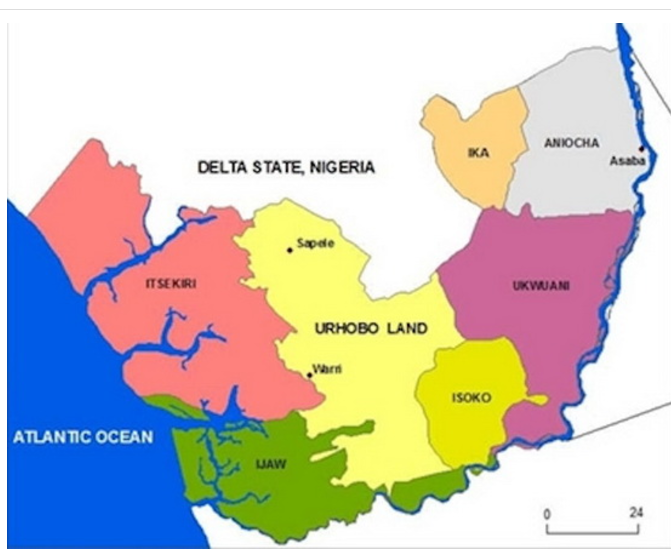Urhobo Daily is an online news portal of daily updates on Urhobo nation and the Niger Delta region.
Let’s explore the fascinating world of the Urhobo people. They are a vibrant ethnic group in southern Nigeria, as mentioned by Urhobo Daily.
The Urhobo Nation: A Brief Overview
The Urhobo people are part of the rich cultural tapestry of Nigeria. Here are some key points about the Urhobos:
Geographical Context:
The Urhobos primarily inhabit the northwestern Niger Delta region, specifically in Delta State. Their territory lies between latitudes 6° and 5°, 15° North, and longitudes 5°, 40° and 6°, 25° East1.
The Urhobo share borders with several neighboring ethnic groups. The Isoko are to the southeast. The Itsekiri and Ijaw are to the west. The Bini are to the north. The Ijaw are to the south. The Ukwuani people are to the northeast.
Language and Population:
The Urhobo people speak the Urhobo language, which belongs to the Benue-Congo branch of the Niger-Congo language family.
The population is estimated to be around 7 million.
Traditional Structure and Governance:
The Urhobo society is organized into 22 autonomous republics or kingdoms, each with its unique history and cultural practices.
At the helm of each kingdom is an Ovie (king), who symbolizes the people’s culture and lineage. The Ovie’s council includes the Otota (speaker) and the Ohonvwore or Okakuro (collectively addressed as Ilorogun).
Other titles within Urhobo governance include the Ikoikpokpo (executioners) and the Ogbu (warriors).
Historical Roots:
The Ughelli and Agbon Kingdoms are among the oldest in Urhoboland, tracing their origins back to the 14th century. Ughene is the great ancestor and founding father of Ughelli. He is said to be the second son of Oghwoghwa, a prince from the Benin Kingdom.
The Okpe Kingdom, another significant Urhobo kingdom, predates the arrival of the Portuguese in the 15th century. It was formally established in the 17th century, and the Okpe people later migrated to found present-day Sapele.
Urhobo territory is characterized by lush evergreen forests dotted with oil palm trees.
A network of streams crisscrosses the region, their flow influenced by seasonal changes.
Cultural Diversity:
While the title “Ovie” is common, some Urhobo cultural divisions use different titles. For instance:
- The Okpe call their traditional ruler the “Orodje.”
- Okere-Urhobo uses “Orosuen.”
- Agbarho employs “Osuivie.”
- The Urhobos in the Olomu Kingdom refer to their king as “Ohworode.”
Additionally, some southern Urhobo clans practice the Odio system, akin to practices in the neighboring Isoko region.
The Urhobo people are a vibrant community. They have a rich heritage and distinct language. They also share a deep connection to their land. Their cultural diversity and historical resilience continue to shape the fabric of Nigeria’s cultural mosaic.
Is there anything specific you’d like to explore further about the Urhobo nation? Feel free to Contact us







Leave a Reply